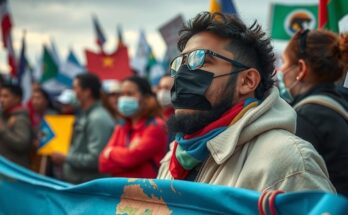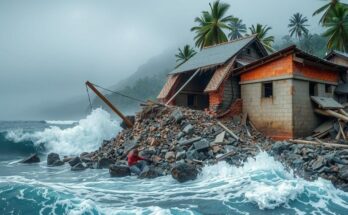The Vatican is obstructing discussions on women’s rights at COP29 due to disagreements over gender and LGBTQ+ recognition, forming a coalition with several conservative countries against a crucial deal aimed at supporting women affected by climate change. This deadlock threatens the success of the Lima Work Programme on Gender as it approaches expiration, highlighting the urgent need for inclusive dialogue and representation in climate negotiations.
The ongoing COP29 climate summit has witnessed a considerable conflict among nations regarding gender rights, notably instigated by the Vatican’s opposition to discussions surrounding women’s rights. Reports from sources indicate that representatives from the Vatican have allied with Saudi Arabia, Russia, Iran, and Egypt to obstruct a proposed agreement that aimed to enhance support for women affected by climate change. Notably, Colombia’s environment minister articulated the urgent need for action, stating that women and girls currently constitute 80% of those displaced as a result of climate-related issues.
The potential deal was intended to update the Lima Work Programme on Gender, which has been in place for a decade, addressing the disproportionate impacts climate change has on women. However, this initiative has encountered resistance, particularly regarding the terminology associated with “gender,” which these nations argue may encompass transgender women and thus complicate their stance on LGBTQ+ representation. There was also a campaign to remove references to gay women from the discussions. The delay in negotiations is raising concerns among watchdog organizations and negotiators from varying nations, jeopardizing critical support mechanisms for women facing the brunt of environmental challenges.
Furthermore, historical context reveals that women are expected to bear a heavier burden due to climate change conditions, as they play primary caregiving roles and often lack access to necessary reproductive health resources during crises. With the looming expiration of the current UN gender programme regarding climate change, failure to reach an agreement at COP29 could result in a significant void in global strategies aimed at supporting women.
Equally concerning is the inadequate representation of women within the negotiating framework at the summit, hampering their voices and lived realities from being adequately reflected in the outcomes. The European Union’s recent commitment to empowering women amid climate initiatives could provide a counterbalance in these discussions; however, this emerging discord underscores a broader trend of resistance against gender rights and LGBTQ+ recognition on numerous global platforms.
The Vatican’s intervention at COP29 has emerged as a pivotal point of contention among member states, highlighting ongoing tensions surrounding gender rights within the broader context of climate change negotiations. The historical marginalization of women in climate discourse, coupled with a significant knowledge base recognizing their vulnerabilities—especially in the face of displacement due to climate disasters—fuels the urgency for targeted support. The Lima Work Programme on Gender has sought to address these disparities for over a decade; however, evolving societal dynamics and rising conservativism against gender inclusivity have complicated these efforts. As countries aim to renew commitments and frameworks to advocate for women, the Vatican’s recent stance raises pressing questions about the future of gender rights and representation in climate negotiations.
The discord at COP29 over gender rights, particularly instigated by the Vatican’s position, poses a significant threat to advancing women’s support in the face of climate change. The response from various Colombian representatives articulates the sense of urgency in ensuring that the specific needs and vulnerabilities of women are recognized and addressed. As the world converges on dealing with climate challenges, the upcoming negotiations will be decisive for determining the feasibility of the Lima Work Programme on Gender and the future of women’s rights in climate discourse. Without crucial dialogue, there remains a risk of erasing gender considerations in critical climate strategies ahead of the programme’s expiration.
Original Source: www.bbc.com




